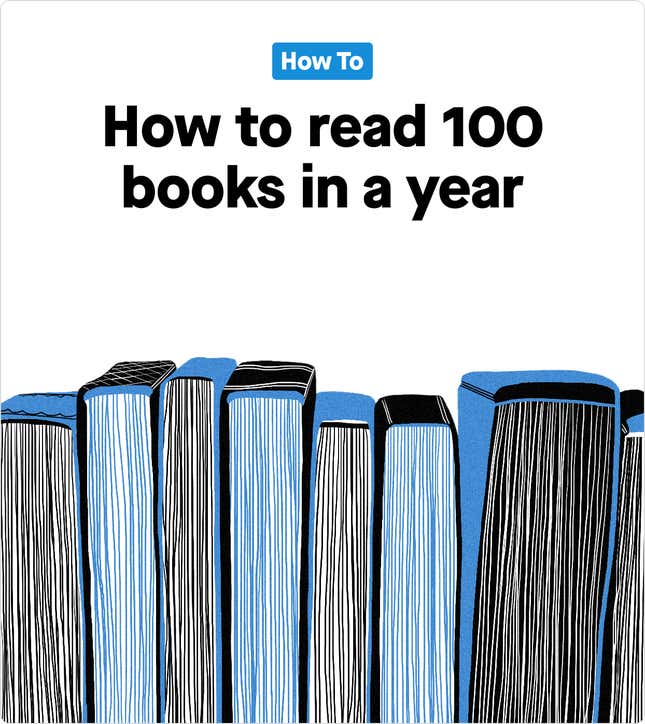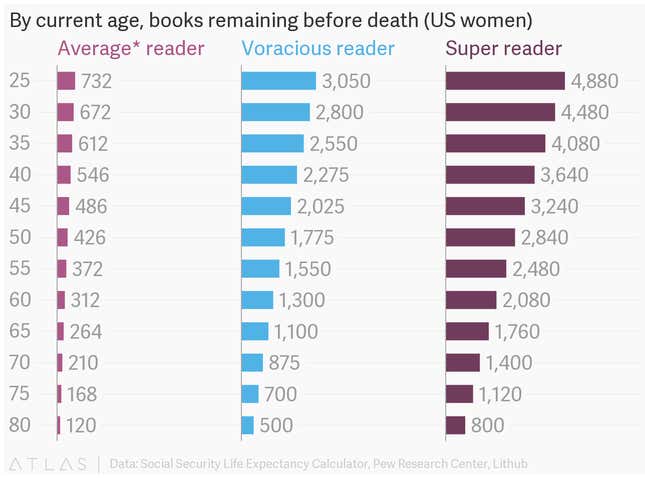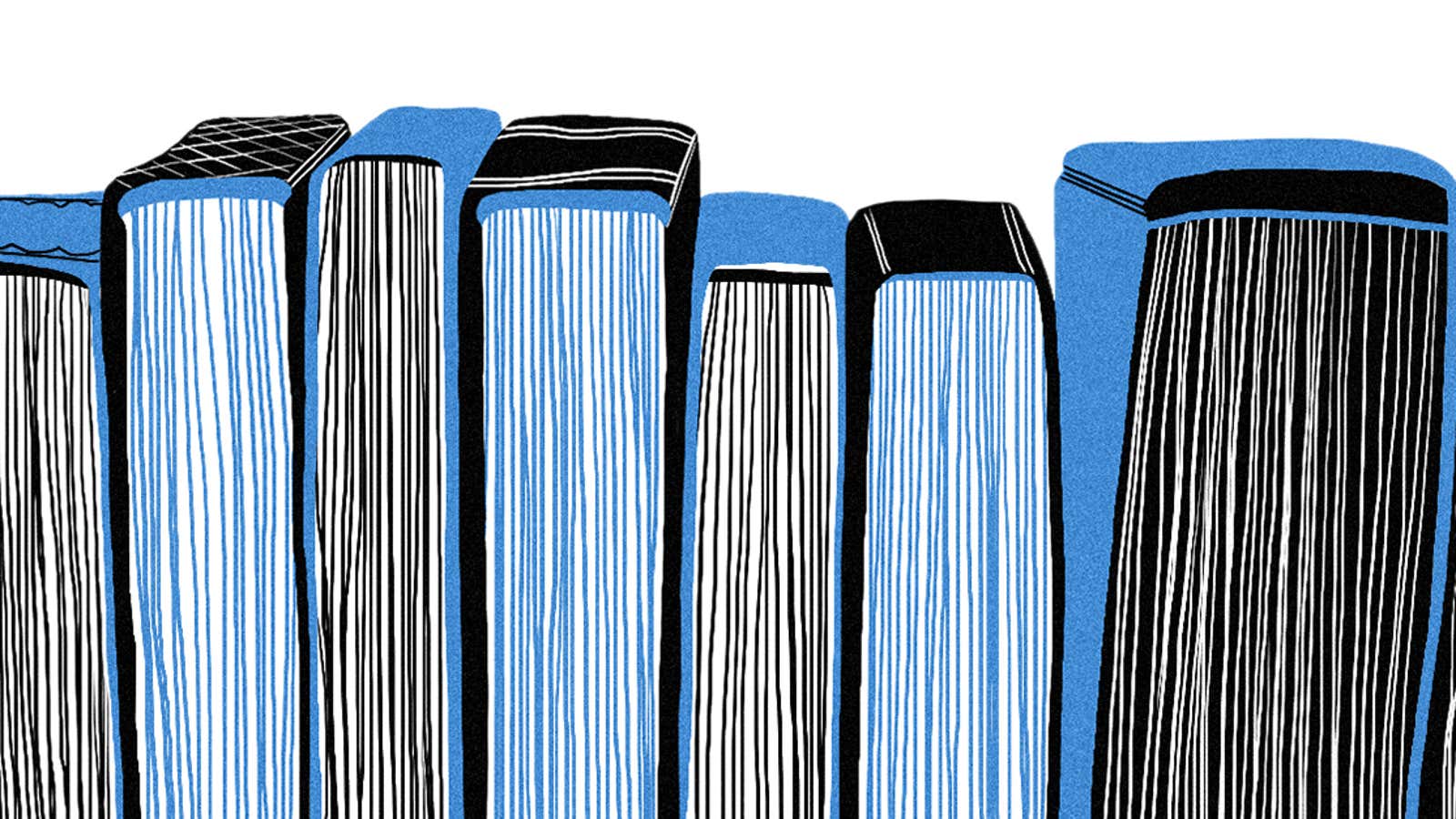
Hi Quartz members—
In 2007, then-US president George W. Bush’s reading list for 2006 was making the rounds, and I was annoyed. The man was, reportedly, devouring a whole lot more books than I—at the time a grad student in English. In an effort to push myself to read as many books as possible, and partly to prove that no sitting president has any business having this much free time, I started keeping track of the books I read in a year.
Just paying attention to my own numbers seemed to send them ticking upward from 20 to 30. By the time I was setting annual books-read goals for myself in 2015 (40 📚, which I did not achieve), I started actively searching for more ways to wring pages out of a day.
That year was the year my mental well-being skyrocketed along with my Goodreads stats. Reading not only reduces your stress levels, makes you more empathetic, and slows cognitive decline, it distracts you from the idle scrolling that’s not doing anything good for you at all.
100 ain’t nothing but a number
Maybe 100 books doesn’t capture your imagination. Maybe you’d prefer to quantify your reading in pages, or time spent, or authors read. Right now, for example, I’m reading two books totaling 1,654 pages (House of Leaves, by Mark Z. Danielewski and Tune In, by Mark Lewisohn) and so will not be reading anywhere close to 100 books this year. I have decided to feel satisfied with this.
Free up some time
Reading more largely comes down to simple time math. What is taking up time that you could be spending reading? Here’s a hint: it’s probably something that involves an endless scroll.
Consider your socials. Doomscrolling and FOMO take a toll on your mental and physical health, while sucking up time you could be spending doing something good for yourself. The year I decided to delete my Instagram account, I read 29 more books.
TV will still be there. Good shows are worth your time, but flipping around idly simply because it’s there is not. Until someone at work demands you get into The Chair or the next season of The Great British Baking Show premieres, consider reading through your evening once in a while.
Welcome more formats
Yes, yes, the feel and smell of a physical book. We get it, it’s wonderful. By all means keep a paper book going, but consider:
🎧 Audiobooks. I don’t find myself looking forward to curling up with a nonfiction book before bed, but being read to while I do other things works perfectly. Beware, though, a bad narrator can ruin a book.
📱Ebooks. The amount of time you spend waiting in line, waiting for your kid to clean up their Legos, just waiting in general—it adds up. Instead of scrolling, you’ve now got something else to do. For me, ebooks work best when they are page-turners.
🤹♂️Juggle your books gracefully. I have a three-book system going at all times: One paper book to read at night, one audiobook for listening to while I cook dinner or take walks, and one ebook for when it’s just me and my phone.
Build a deep queue
Reframe how you think about having 300 books on your Want To Read shelf on Goodreads. It’s not homework, it’s insurance against wasting time as you find something to read.
💳 Join the library. Nearly all library systems now have some app that delivers their virtual catalogs. Don’t be put off by long wait lists, they’re just gifts for Future You.
🙌 Find your book sherpas. Start your list by identifying a couple of like-minded folks and ask them to recommend you 10 books each. Follow them on Goodreads or Italic Type and pay attention to what they rate highly and who they follow. Quartz’s #books Slack channel has become my go-to source for queue-building, and my favorite local bookshop’s Staff Picks rarely lets me down.
🪓Know when to quit. If you hate a book, stop reading it. You need something that will suck you in or you’ll find excuses to spend your time elsewhere.
Some recommendations to get you started
✈️Great Circle, by Maggie Shipstead: For fans of meaty novels that take you out of your own head. (It was also just announced as a Booker Prize finalist.)
🌋The Fifth Season, by N.K. Jemisin: For fans of fantasy, sci-fi, geology, or sociology—it’s all there, and it’s explosive.
🧠 Sapiens, by Yuval Noah Harari: For those who want to annoy everyone around them with fascinating facts about our species.
🌧A Swim in a Pond in the Rain, by George Saunders: For those who aren’t totally sure how to get the most from a story and could use an excuse to feel warmly towards fellow humans.
Let me know what you read this weekend,
—Susan Howson, email editor (once took Pride and Prejudice to summer camp and can provide you with lots of good recommendations)
One 📖 thing
Quartz’s Kira Bindrim (2020 📚 count: 100) did some digging into how many books it’s actually possible to read in a lifetime by type of reader: average (12 books a year), voracious (50), and super (80).

US men will manage about 100-400 fewer books by the time they kick the bucket, which, if they turn their pages correctly, could be extended by the very act of reading. A 2016 study by Yale University School of Public Health tracked adults for 12 years and found that those who read 3.5 hours a week were 23% less likely to die.
